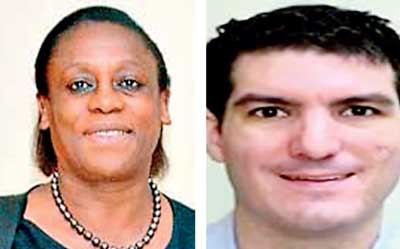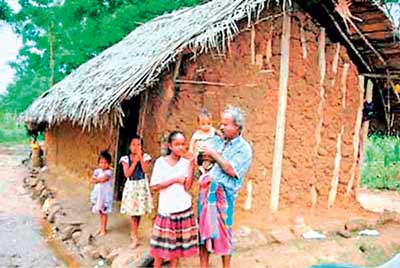Sunday Feb 15, 2026
Sunday Feb 15, 2026
Monday, 17 October 2016 00:01 - - {{hitsCtrl.values.hits}}
 By Idah Pswarayi-Riddihough and
By Idah Pswarayi-Riddihough and
David Newhouse
Over the past decade, Sri Lanka has made rapid strides in combating poverty. People are earning more and are better off in a variety of ways. School attendance and school completion rates among children are on the rise. More people now own durable assets such as motorbikes and mobile phones. Extreme poverty – at less than two percent of the population – is already rare, and its eradication is within reach.
Yet, these encouraging statistics are cold comfort to those that continue to struggle to secure food and to meet basic needs. A large proportion of Sri Lankans, live just above the official poverty threshold and are vulnerable to falling back into deprivation. In 2013, for example, nearly half of Sri Lankans lived on less than Rs. 250 per day. So much work remains to be done.
This is why President Sirisena’s recent declaration of 2017 as the year of poverty alleviation is welcome news to us at the World Bank Group. At a country diagnostic launch event earlier this year, Prime Minister of Sri Lanka Ranil Wickremesinghe stated, “A priority for us is the creation of more jobs that will minimise poverty and provide for prosperity for all Sri Lankans. Towards this, we need to enhance our capacity to successfully compete in global markets while creating the necessary space for investments to come in.”
This commitment to further improve the living standards of all Sri Lankans is perfectly aligned with our core mission to end extreme poverty and promote shared prosperity through inclusive growth. We are in full agreement with the Government of Sri Lanka that these goals will be achieved only through a comprehensive program that connects the public sector, the private sector as well as all non-governmental institutions. This year’s End Poverty Day provides an excellent opportunity to take stock of where Sri Lanka stands in its efforts to improve the well-being of its people, and to eradicate the last remnants of poverty from the country.
Sri Lanka has been able to drive down poverty because the poor have earned more. The economy has been gradually shifting away from agriculture, where small-scale farmers often struggle to eke out a living, into industries and services. The slow but steady  industrialisation of the economy is accompanied by the expansion of urban hubs and road networks that better connect regions, especially along the Colombo-Kandy-Galle/Matara corridors. These sources of growth will likely continue as more people transition out of agriculture into more productive service and industrial jobs.
industrialisation of the economy is accompanied by the expansion of urban hubs and road networks that better connect regions, especially along the Colombo-Kandy-Galle/Matara corridors. These sources of growth will likely continue as more people transition out of agriculture into more productive service and industrial jobs.
The end of conflict in 2009 also played an important role in reducing poverty. It led to a surge in the construction and service sectors, as well as a greater inflow of tourists. At the same time, sharp rises in the international prices of food and tea spurred a major rise in minimum wages for agricultural workers. However, with the recent fall in international food and tea prices and the fading of the post-conflict boom, these sources of growth, with the exception of tourism, cannot be counted on to continue in the medium term.
Yet, simply sustaining economic growth will not be enough; it will be equally crucial to ensure that growth benefits all segments of society. Between 2009/10 and 2012/13, the poorest 40 percent of the population only captured only 15% of the country’s total consumption growth. Inequality in the country increased noticeably. In fact, Sri Lanka stands out as the only country in the region where inequality, measured by the Gini index, rose between 2009/10 and 2012/13.
Beneath the surface of national indicators, inequality is determined by where people live. Those living in the estate sector, for instance, continue to lag behind, especially in the non-monetary dimensions of welfare such as educational attainment, housing conditions, and access to clean water. Severe pockets of poverty also remain in Mullaitivu, Batticaloa, and Moneragala District, where in some DS Divisions one out of every three persons lives in poverty.
What can be done to make sure that economic growth benefits the least well-off in Sri Lanka? In the Bank’s experience, what works is the implementation of policies that first, boost poor workers’ productivity and, second, provide more effective support to poor households. Boosting productivity calls for making the right investments in people, like quality education and training that can help workers compete in a more industrialised and internationally integrated economy. It also requires investing in infrastructure in poor areas, such as in roads and in energy, to help better integrate economies and deliver services. Many of the poor earn their livelihoods in the agricultural sector, and reforms in that sector deserve special attention. These include efforts to modernise the sector, diversify into higher value crops, and develop the production chain that links small farmers to new markets, alongside trade-friendly policies that take advantage of export opportunities. Finally, given Sri Lanka’s low rate of female participation in the labour force, identifying and removing obstacles to women’s participation in the economy is critical to promoting sustainable and inclusive growth.
David Newhouse, World Bank Senior Economist adds that targeted reforms to social and fiscal policy can help support the poor more effectively. Reforming safety net programs like Samurdhi will help identify the poor more accurately and transparently, and minimise leakage to wealthier households. Fiscal policies can also work better for the poorest – for example, by expanding the tax base, increasing the role of income tax, and removing tax exemptions and programs that largely benefit wealthier households. These efforts will improve the country’s macroeconomic stability and allow for more investment in social protection programs. Finally, a comprehensive effort to rigorously monitor and evaluate how well existing social programs are performing can help ensure that public spending can be focused on those programs that most benefit the poor.
We are excited that the Government of Sri Lanka has made such a firm commitment to fighting poverty, and the Bank is committed to continuing a partnership with a vision to eradicate extreme poverty, while promoting shared prosperity. With the right policy reforms, we are confident that Sri Lanka will continue to make progress towards ensuring that a broader swath of its people enjoys the full benefits of economic growth. The poorest Sri Lankans deserve nothing less than our best efforts.
(Idah Pswarayi-Riddihough is World Bank Country Director for Sri Lanka and the Maldives and David Newhouse is World Bank Senior Economist).